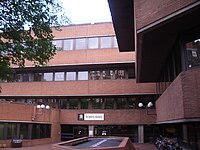Kensington and Chelsea Council
| Kensington and Chelsea London Borough Council | |
|---|---|
| Whole council elected every four years | |

Coat of arms
|
|
| Type | |
| Type | |
| Houses | Unicameral |
|
Term limits
|
None |
| History | |
| Founded | 1 April 1965 |
| Preceded by | Chelsea Borough Council Kensington Borough Council |
|
New session started
|
22 May 2013 (Municipal year 2013/2014) |
| Leadership | |
|
Nick Paget-Brown, Conservative
Since 6 May 2013 |
|
|
Mayor
|
Maighread Condon-Simmonds
Since May 2014 |
| Structure | |
| Seats | 50 councillors |
|
37 / 50
|
|
|
11 / 50
|
|
|
2 / 50
|
|
| Elections | |
| Plurality-at-large | |
|
Last election
|
22 May 2014 |
|
Next election
|
2018 |
| Meeting place | |
 Town Hall, Hornton Street |
|
| Website | |
| www |
|
Kensington and Chelsea London Borough Council is the local authority for the Royal Borough of Kensington and Chelsea in Greater London, England. It is a London borough council, one of 32 in the United Kingdom capital of London. Kensington and Chelsea is divided into 18 wards, each electing three councillors. The council was created by the London Government Act 1963 and replaced two local authorities: Kensington Metropolitan Borough Council and Chelsea Metropolitan Borough Council. The borough council provides some shared services with Hammersmith and Fulham, and Westminster.
There have previously been a number of local authorities responsible for the Kensington and Chelsea area. The current local authority was first elected in 1964, a year before formally coming into its powers and prior to the creation of the London Borough of Kensington and Chelsea on 1 April 1965. Kensington and Chelsea London Borough Council replaced Kensington Metropolitan Borough Council and Chelsea Metropolitan Borough Council. Both were created in 1900 and replaced the Vestry of the Parish of Kensington and the Vestry of the Parish of Chelsea.
It was envisaged through the London Government Act 1963 that Kensington and Chelsea as a London local authority would share power with the Greater London Council. The split of powers and functions meant that the Greater London Council was responsible for "wide area" services such as fire, ambulance, flood prevention, and refuse disposal; with the local authorities responsible for "personal" services such as social care, libraries, cemeteries and refuse collection. This arrangement lasted until 1986 when Kensington and Chelsea London Borough Council gained responsibility for some services that had been provided by the Greater London Council, such as waste disposal. Kensington and Chelsea became an education authority in 1990. Since 2000 the Greater London Authority has taken some responsibility for highways and planning control from the council, but within the English local government system the council remains a "most purpose" authority in terms of the available range of powers and functions.
...
Wikipedia
